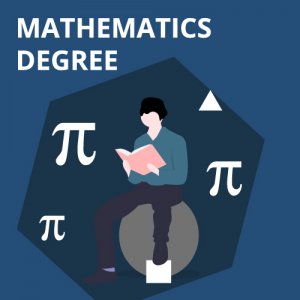What Kind of Accreditation Should My Degree Program Have?
Before choosing the relevant educational institution to enter, find out whether it has proper accreditation.
Accreditation approves the credibility to the educational institutions and their merit.
And your degree in maths from the accredited university or college will assure your employer in good quality of your education.
Accreditation means the approval of the quality of education in the university, college or school by the Department of Education.
The accreditation process is the process of revision of the educational institution during which specialized organizations check the university.
To gain accreditation, the university must stick to the standards and demands of the Department of Education.
As a rule, only that colleges or universities who have proved quality of their education, are entitled to monetary aid from the government.
Moreover, accreditation typically means the institution not only to maintain and prove its standards but also to continue to enhance its competence within a professional field.
While searching for the right institution, you have to distinguish between two types of accreditation: institutional and program accreditation.
The latter proves that only a specific discipline or area of study obtained accrediting approval.
Meanwhile, the second one means the general accreditation of the educational institution.
To begin with, there are special accrediting organizations that revise and prove the college or university sticks to the educational standards.
Such accrediting bodies are divided into two groups: regional and national agencies.
Therefore, accrediting agencies have the competence to decide on giving or not giving the approving stamp to the school or university.
You have to recognize that such approval is highly assessed and your future employers will definitely pay attention to this issue.
We recommend you to seek the university with the approval from any of below mentioned regional accrediting agencies:
- The Higher Learning Commission
- Western Association of Schools and Colleges
- Program Accreditation
- New England Association of Schools and Colleges
- Middle States Commission on Higher Education
- Northwest Commission on Colleges and Universities
- Southern Association of Colleges and Schools Commission on Colleges
If you want to assure your educational institution has the stamp of approval, then contact the administration and get detailed information.
Also, you can check the Department of Education’s database.
What Kinds of Mathematics Degrees Are There?
Educational institutions divide the study of maths into three main approaches.
One of them, the theoretical approach includes studying math together with philosophy.
Second, of them, the education-based approach focuses on the study of teaching methodology in combination with maths.
Eventually, third of them, applied mathematics covers both maths and science.
Associate Degree in Maths
We guess the Associate’s degree in Mathematics is the threshold to a professional world.
The program takes 2 years and contains 60 credits.
While studying this course you will get basic knowledge in statistics, geometry, algebra, and trigonometry.
The program will be a good basis for the future earning of a bachelor’s degree because you will be acquainted with the introductive study material.
An associate degree will lay the beginning of your future career as an accountant, banker, economist or businessman.
Within the course to get the associate degree you will learn the next subjects:
- Calculus I through III
- Differential Equations
- Pre-Calculus
- Discrete Math
- Linear Algebra
- Statistics I and II
Bachelor’s Вegree in Mathematics
The second but not last step into your future prospective career is getting a bachelor’s degree in Maths.
This degree usually requires 120 credits and takes 3 or 4 years to complete.
Being the bachelor of maths means be educated profoundly, because on the basis of this degree you can find a good job.
Thus, you can search for occupation in the areas of business, computer programming and computer science, statistics and economics.
Nevertheless, the employer will not be able to offer you the high-ranking positions, only the assistance of the chief.
That’s why you should continue your studying and obtain a master’s degree.
During the study to obtain the bachelor’s you will learn many new subjects:
- Applied Partial Differential Equations
- Theory of Statistics
- Introduction to Abstract Algebra
- Vector Calculus
- Formal Mathematical Reasoning and Writing
- Computational Thinking and Doing
- Theory of Complex Variables
- Analysis of Ordinary Differential Equations
The Main Difference Between a BA and a BS in Mathematics
Generally, there is no difference in the requirements to enter the BA and BS in Mathematics.
However, there is a difference between the courses of these two programs.
The BS or Bachelor of Science classes is science-oriented.
Meanwhile, the Bachelor of Arts courses in maths has additional classes on humanities.
Master’s Degree in Mathematics
To get a master of mathematics you should study for 1 or 2 years after you got the bachelor’s degree.
Master’s degree can usually require 24-90 credits or even more.
But you can also find the program in some universities which give you the opportunity to save funds and finish bachelor’s and master’s programs in 5 years.
While getting the master’s degree your program of study will be orientated to your future professional specialization.
Moreover, during the master’s degree course, you will get a lot of useful knowledge and skills.
After you finish the degree, you will be able to find a good position, for example, in the fields of business planning, banking, civil engineering, actuarial work, and more others.
Also, you have an option to decide to get the MS (masters of science) or MA (masters of arts) in Maths.
There is a list of courses you will listen to during the master’s course:
- History of Mathematics
- Analysis I and II
- Numerical Analysis
- Metric Spaces
- General Topology
- Modern Algebra
- Theory of Functions of Real Variables
Ph.D. of Mathematics
The Doctor of Philosophy in Mathematics is the advanced degree.
Ph.D. typically needs five or more years to complete.
During that period of time you will do two years of coursework and the rest of three years you will be working on your dissertation.
Ph.D. will be interesting for future scientists who want to make their contribution in this field.
After getting the Ph.D. you can choose to become a professor-researcher, or you can try yourself in the developing of public policy.
What Kind of Licensing or Certification Do You Need?
What is the Difference Between Licensing and Certification?
A non-governmental body or professional organization usually award certification in different fields to the graduates with or without a degree.
On the contrary, licenses are awarded by governmental licensing agencies only.
Also, by having obtained a license in this or that field, you will be a legally authorized employee.
To compare, the companies do not necessarily require certification due to the fact that asking for a certificate is not legal actually.
At the same time, if you want to have a license, be ready to meet the requirements like getting a degree or passing a state exam.
These are the main differences according to the Bureau of Labor Statistics.
Do You Need to Be a Licensed Mathematician?
It’s not commonly required in most of the industries.
You must be skilled, and have a degree in Mathematics to apply for most jobs.
Nevertheless, if you are going to work as a Maths teacher, you should get a license to become really valuable.
The teaching license can be got and renewed at the Department of Education of your state.
If you are thinking of teacher’s license, keep in mind the following criteria for renewal:
- Accommodation of curriculum, materials, and instruction, as well as its modification
- Positive behavioral intervention strategies
- Key warning signs for early-onset mental illness in children and adolescents
- Reading preparation
- Technology
- Reflective statement of professional accomplishment and assessment of professional growth
Popular Degree Programs
What Can You Do With This Degree?
After getting your degree in Maths, you will be able to choose among numerous professions.
Some of the most popular are:
- Mathematician
- Accountant
- Statistician
- Actuary
- Economist
- Programmer
- Analyst
- Engineer
How Much Can You Make With This Degree?
According to data from the Bureau of Labor Statistics, people who have a degree in Maths earn a good average salary for their comfortable living, for instance:
- Mathematician and Statistician — $81,950
- Operation Research Analyst — $79,200
- Quantitative Finance — $81,760
- Accounting — $68,150
- Actuaries— $100,610
- Mechanical Engineer — $84,190
- Civil Engineer — $49,980
What Professional Associations or Societies Should You Join?
If you want to get good acquaintances in your professional field, then you would better join some Professional Associations.
Within the Professional Mathematics Associations or Societies, you can visit workshops, lectures, and other events, which will help to increase your social status and enhance your skills.
We will name some of the well-known mathematics associations for your better understanding.
- Society for Industrial and Applied Mathematics
- Society of Actuaries
- American Mathematical Society
- American Statistical Association
- Association for Women in Mathematics
- Benjamin Banneker Association
- National Council of Teachers of Mathematics
Summary
Now you are aware of the main aspects of getting a degree in Mathematics.
We hope that our article was useful and gave you a better understanding of the issue.
We also want to wish you good luck in all your beginnings.
See More Degrees
What can you do with a degree in...







